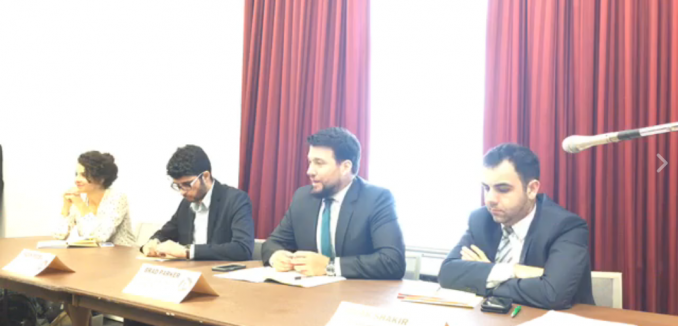In a recently published op-ed in The Forward, Peter Beinart discusses a video produced by The Israel Project that covers a pro-Palestinian panel discussion on Capitol Hill. Beinart claims that, here at The Israel Project, we don’t want you to watch the hour and a half video of the event. On the contrary: we encourage it. It’s why we published our own commentary on the event. Three TIP fellows were at the event that took place on June 8th, and we want to point out some key issues with Beinart’s article and also direct attention to a major flaw with the event as a whole.
In his June 21 op-ed, Beinart bashes The Israel Project’s video illustrating anti-Semitism in the June 8 panel discussion, which was sponsored by Representative Mark Pocan (D-Wisc.) on behalf of the No Way to Treat a Child campaign. Beinart calls the TIP video “a shameless attack,” and defends the content in the panel discussion. In the video, TIP highlights the last speaker on the panel, Nadia Ben-Youssef, who makes a point of placing the Palestinian narrative into the context of the establishment of the state of Israel in 1948. “The occupation is an outgrowth. The occupation is a symptom,” Ben-Youssef said. “We’re going to start this story in 1948.” Through this rhetoric, Ben-Youssef espouses the belief that the very existence of the state of Israel is the root of the problem for the Palestinians. The TIP video points out that this sort of delegitimation of Israel is unacceptable.
Beinart, however, expresses a slightly different view. In his op-ed, he says, “I believe that in a post-Holocaust world, it’s important to have one country on earth that assumes a special obligation to protect Jewish life.” This directly contradicts the video he is defending, in which Nadia ben-Youssef says, “Nakba. Remember that name, say that name. It means catastrophe in Arabic, and it refers to the founding of the state of Israel in 1948.” She goes on to belittle the nature of Israel as a Jewish and democratic state, saying “as if that makes sense.”
While this event was branded as “50 years of Occupation and Life for Palestinian Children,” Ben-Youssef clearly says that the problem goes back to the establishment of a Jewish state in 1948. She is claiming that it is a catastrophe that a Jewish homeland exists. In his piece, Beinart mentions two tangentially related Ben-Youssef quotes about the Jewish homeland. He ignores, however, the core of what the TIP video highlights, which is Ben-Youssef’s fixation on the establishment of Israel as the basis of the problem she is discussing. This sentiment directly contradicts Beinart’s belief in the importance of a state with “a special obligation to protect Jewish life,” yet he overlooks her argument entirely.
Yet, perhaps the most disturbing aspect of Beinart’s argument is that he misses the most glaring problem with the event: it completely ignores the fact that the Palestinian Authority in the West Bank, and especially Hamas in the Gaza Strip, fundamentally shirk their responsibilities to protect the human rights of children living under their jurisdiction.
The violence and routine human rights abuses which Hamas, as well as the Palestinian Authority, inflict upon Palestinian children and adults is well documented. In Gaza, young children are indoctrinated from their earliest years of schooling with Hamas’ ideology. In public ceremonies, such as one at a kindergarten graduation last year, children dressed up as terrorists raid Israeli homes while a narrator encourages the audience to “Stab! Kill the occupier with stones and knives!”
Hamas policies in Gaza, including its inability to solve the electricity crisis, further contribute to the suffering of Palestinian children. Its continued use of UN facilities, including schools in crowded residential areas, to fire rockets at Israeli civilians also endangers the lives of thousands of Palestinian children. This, of course, is part and parcel of the fact that Hamas’ takeover of Gaza one decade ago, which it has maintained through human rights abuses including summary executions, was the very thing that triggered the subsequent Israeli and Egyptian embargo on the enclave. Omar Shakir, the first speaker at the panel event, fails to mention Hamas at all in his monologue on the worsening conditions in Gaza. Even after ten minutes of speaking about Gaza, upon acknowledging the ten-year anniversary of the blockade, Shakir did not find it pertinent to note that Hamas’ coup d’état precipitated Israel and Egypt’s decision to reduce the movement of people and goods in and out of the territory.
Additionally, the panel failed to address the responsibility of the Palestinian Authority in the continued suffering of Palestinian children in the West Bank. The textbooks used in Palestinian Authority-run schools teach children to become “expendable martyrs,” while its corruption continues to hurt the local economy. Instead of addressing chronic unemployment and poverty, the Palestinian Authority continues to pay millions to the families of convicted terrorists and uses its media outlets to incite Palestinians into violence against Israelis. This behavior makes the prospects for peace dimmer. With such leaders and policies, opportunities for Palestinian children to lead normal, healthy, violence-free lives are threatened.
The No Way to Treat a Child campaign and Peter Beinart refuse to address these facts. Such a one-sided explanation of the Israeli-Palestinian conflict is counterproductive. Inflammatory rhetoric such as this demands a response. We invite everyone to watch the recording of this event with this context in mind.
Gary Dreyer, Tamar Leveson, and Jeremy Schooler are 2017 Tower Tomorrow Fellows at The Israel Project. The Israel Project publishes The Tower.
[Photo: Defense for Children International – Palestine]




